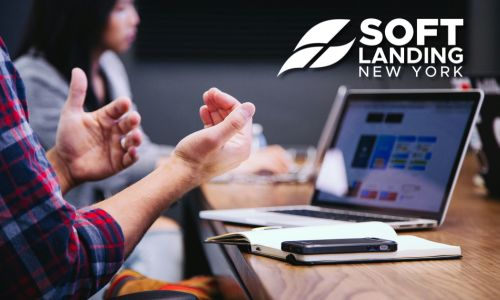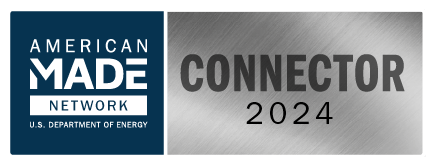
On Tuesday, Jan, 30, Elena Iankova, program director, welcomed the Soft Landing New York Spring 2024 participants to their first virtual class meeting. This cohort is the fourth of the program with the largest class size to date of 20 international startups.
Representing 13 countries across four continents, these startups come from the food, agriculture, clean energy, healthcare and optics, data management, legal consulting, automotive, and construction and real estate industries.
“Since the launch of the soft landing program in the Fall of 2022 we have had 54 participating companies coming from 32 countries and five continents — Europe and the Middle East, the Americas, Asia, Africa and Australia,” said Iankova. “The ultimate goal of this federally-funded soft landing program is to bring positive economic impact to the Binghamton area by helping foreign startup companies establish operations in the region and create new jobs for local residents. By providing excellent support services and collaborating with important stakeholders and business service providers from the whole region we have high hopes that most of the companies that have gone through the Soft Landing program will be determined to establish a presence in our region and integrate successfully into the local communities.”
During the welcome session, participating startups heard remarks from Per Stromhaug, associate vice president of innovation and economic development at Binghamton University, and Linda Barrington, associate dean for strategy and societal impact at Cornell University’s SC Johnson College of Business. Following the remarks were introductions from the Soft Landing New York team, including program mentors Eric Krohn, Mike Jagielski, Derek Simmonds and Bandhana Katoch.
The welcome presentation included some of the perks of doing business in New York State. This included the power of the state’s economy — including the fact that if New York State were an independent nation it would have the eleventh largest economy in the world — and tax-based incentives for business owners such as the New York State Tax Credit Program, Start-Up New York’s Tax-Free Program, an Employee Training Incentive Program, a 0% corporate income tax rate for manufacturing, and more. The presentation then continued to describe the industry and innovation hub emerging in the Southern Tier.
Diving into an overview of the Soft Landing New York program, it begins with weekly virtual workshops and concludes with an in-person Market Exploration Bootcamp in Binghamton with programming throughout the Southern Tier in April 2024.
The virtual weekly meetings include workshops on the U.S. business environment, an optional segment on customer discovery in the U.S. market, tailored mentorship support, student research assistance to aid in growing the company in the U.S., the ability to make impactful connections with local stakeholders and discounted facility usage at the Koffman Southern Tier Incubator. With the Soft Landing New York program operating out of the Koffman Incubator, participating international startups are eligible to receive six months of free co-working membership and mentorship, and access to the incubator’s programs, events and network.
The Soft Landing New York market exploration bootcamp hosted in person in Binghamton, NY is a three-day program that offers the participating startups deep-dive seminars and opportunities to meet mentors and stakeholders face-to-face. Here, they will be able to experience the startup ecosystem in New York’s Southern Tier and visualize their place in it.
Following the program overview, the participating startups presented their companies, goals with the U.S. market and what they are hoping to achieve through participating in the Soft Landing New York program.
The Spring 2024 Soft Landing New York cohort welcomes the following foreign startups:
- Translational Research and Innovation (TRI) from India: developing cutting-edge products and technology to sustainably transform agriculture by elevating crop productivity and animal nutrition.
- Bialtec SQ from Colombia and Netherlands: seeks to improve animal feed sustainability, efficiency and nutrition from the production of microencapsulated precision probiotics for animals.
- EMKAO Foods Inc. from Canada: produces single-source cocoa products from organic cocoa beans transparently sourced from Cameroon to elevate the livelihoods of cocoa farmers in the country.
- Biointelligenza from Canada: provides biological solutions to nourish soil, increase productivity and improve food safety, without genetic modifications. While effective in the indoor cultivation of many products, Biointelligenza will primarily focus on the cannabis market over the next three years.
- OneCup AI from Canada: utilizes computer vision to monitor and manage herds. BETSY provides ranchers with real-time herd information for breeding purposes and location tracking.
- SMAPP Lab from Hungary: attaches a camera-based IoT device to manual insect traps to identify and provide usable data on insect population and type. This will help farmers protect crops as they receive alerts to high levels of insects and notifications on the best times to use insecticides.
- AkknaTek GmbH from Germany: produces a device that provides diagnostic data to achieve more accurate placement of cataract implants in patients. Their solution provides a complimentary addition to current surgical methods.
- Cosmos Thrace from Bulgaria: develops custom solutions for clients related to their data-based challenges. They help optimize business processes based on data already being collected by their clients.
- H2O-Extra-Here from Italy: is developing a clean process for fat- and water-soluble molecule extraction from hemp and cannabis using vegetable oils. The extracted sugars are then able to be used in products ranging from cosmetics to drinks to hemp terpenes.
- Safsutech from Finland: provides technology using bio-based particles to reduce nitrates and ammonia from processed water. While their target market is fish farms due to their high levels of ammonia, their technology can also be used by municipalities, water treatment organizations, and more.
- EFRESCO from Jordan: developed a trade tech portal to mimic a marketplace to encourage small fruit shops to franchise and become competitive with larger retailers. This virtual marketplace opens smaller shops to expand their customer base and supply chain.
- Zohor XoXo LLC from Algeria: develops innovative solutions for indoor vertical farming by building customized automation systems with IoT sensors to control the climate and lighting. Their proprietary software also manages all vertical farm processes, including monitoring, planning and automation control.
- Legalnova from Colombia: provides legal, tax and accounting advice to entrepreneurs expanding businesses from Latin America to the U.S. and vice versa.
- Meetoptics Labs from Spain: curated the largest database in the optics and photonics industry via an AI-based central platform for engineers and researchers to search for verified products for research.
- Clean Valley CIC from Canada: uses wastewater from fish farms to grow proprietary microalgae that is fed to oysters and shellfish. This replication of natural environments provides fish farms with a green premium and the chance to increase profits.
- XENITAL from Colombia: is an engineering company specializing in the acquisition and surveying of spatial information for asset control.
- Turbulence Technology AD from Bulgaria: develops cutting-edge software to power the intelligent devices and systems in a variety of industries including automotive, defense, aerospace, energy, medical equipment, fintech and battery management systems.
- Keto Newfs from Canada: is a food company specializing in products that meet the principles of the keto diet — meaning they are free from added sugar and have low carbohydrates and sodium, and are gluten free.
- SYNCHROS from Congo: identifies areas at risk for agricultural loss using a specialized technology solution with intelligent drones.
- Building Pulse from India: monitors key areas and appliances in buildings with their energy monitoring platform consisting of hardware sensors and a web-based app to allow facilities minimize their energy use.



